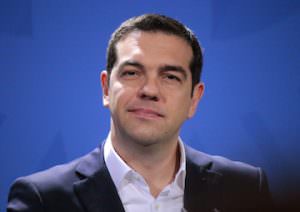World Leaders Huddle, Haggle Over Greece’s Future
Aside from monetary considerations, time is clearly the most important commodity in the ongoing crunch sessions between Greek and European leaders as they hash out a potential rescue strategy to keep Greece in the eurozone and out of financial free fall. Trodler / Shutterstock
Trodler / Shutterstock
Aside from monetary considerations, time is clearly the most important commodity in the ongoing crunch sessions between Greek and European leaders as they hash out a potential rescue strategy to keep Greece in the eurozone and out of financial free fall.
But by the end of Tuesday’s emergency meeting in Brussels, it seemed the Greeks needed a little more time to come up with a concrete plan that would build on the momentum they had drummed up in Sunday’s referendum vote, which soundly registered their rejection of the bailout deal devised by the European Central Bank, the European Commission and the International Monetary Fund.
READ: If You Think What the EU Is Doing to Greece Is Bad, Look at What the U.S. Is Doing to Puerto Rico
As The Washington Post reported, Tuesday’s assembly didn’t yield much progress, and Greece got a five-day deadline to steer clear of bankruptcy:
Following a day of talks in Brussels aimed at finding a way out of months of bitter deadlock, European leaders were scathing in their assessments of Greece’s proposals, calling them inadequate and demanding that the Greek government return with a detailed plan by Friday morning. The leaders of all 28 European Union members will then meet on Sunday in what officials said would be the final chance to save Greece from economic oblivion.
E.U. leaders expressed anger that Greek officials offered only oral proposals, rather than presenting a detailed written plan to address concerns about the country’s debt crisis.
[…] Greece’s government had been widely expected to present a new plan to finance ministers at the Brussels summit, held just days after a Sunday referendum in which Greek voters emphatically rejected Europe’s latest bailout proposal. One of the key elements in that plan was deeper cuts to state pensions.
But instead of a formal blueprint, Greece’s new finance minister, Euclid Tsakalotos, spoke from hand-written notes about his country’s intentions to rein in costs and prop up its creaky fiscal underpinnings.
On Tuesday, President Obama joined the crisis relief effort with phone calls to Greek and German heads of state (via USA Today):
Obama received an update on Greece’s financial situation during the phone call with Tsipras, the White House said in a statement.
For his part, the president “reiterated that it is in everyone’s interest that Greece and its creditors reach a mutually-acceptable agreement,” the statement said.
As for the call with Merkel, the White House said she and Obama cited the need for “a durable agreement that will allow Greece to resume reforms, return to growth, and achieve debt sustainability within the Eurozone. The leaders noted that their economic teams are monitoring the situation in Greece and remain in close contact.”
Reuters also put together a play-by-play timeline of Tuesday’s proceedings in Brussels. Read about it (from the bottom up) here.
–Posted by Kasia Anderson
Your support matters…Independent journalism is under threat and overshadowed by heavily funded mainstream media.
You can help level the playing field. Become a member.
Your tax-deductible contribution keeps us digging beneath the headlines to give you thought-provoking, investigative reporting and analysis that unearths what's really happening- without compromise.
Give today to support our courageous, independent journalists.





You need to be a supporter to comment.
There are currently no responses to this article.
Be the first to respond.